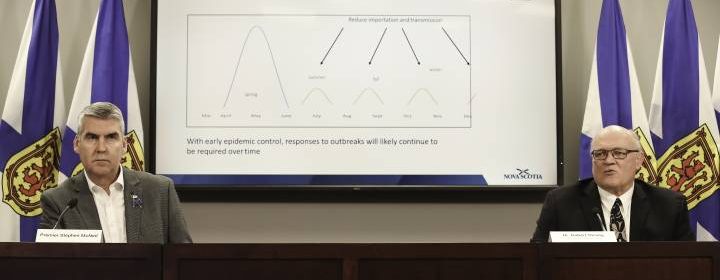Nova Scotia sees 21 COVID-19 patients recover as Northwood reports 1 death

Nova Scotia announced on Saturday that 21 patients diagnosed with COVID-19 recovered from the disease even as Halifax’s Northwood Manor saw an additional person die.
The province has now experienced 47 deaths since the novel coronavirus pandemic began, many of which have occurred at Northwood Manor as a result of an extended outbreak among staff and patients at the facility.
“On behalf of all Nova Scotians, I extend deep condolences to those who are grieving,” said Premier Stephen McNeil, in a press release issued Saturday.
“It is our collective duty to do all we can to slow the spread of COVID-19.”
“We will get through this best by working together and supporting one another.”
[ Sign up for our Health IQ newsletter for the latest coronavirus updates ]
Health officials say that 743 of the 1,011 people who tested positive have recovered from the disease.
There are currently seven people in the hospital as a result of COVID-19. Two of them are in intensive care.
There remain two licensed long-term care homes and unlicensed seniors’ facilities in Nova Scotia with active cases of COVID-19.
One of them is Northwood, which currently has 157 residents and 31 staff with active cases. The other facility has one staff member with active cases of COVID-19.
Dr. Robert Strang, Nova Scotia’s chief medical officer of health, offered his own recommendations for Nova Scotians.
“Whatever you do this weekend, don’t let your guard down,” he said.
“Enjoy the outdoors with only those you live with and connect with others virtually.”
“Maintain social distance, wash your hands, stay home as much as possible and clean high-use surfaces.”
Strang and McNeil are expected to offer their next COVID-19 update on Monday.
Questions about COVID-19? Here are some things you need to know:
Health officials caution against all international travel. Returning travellers are legally obligated to self-isolate for 14 days, beginning March 26, in case they develop symptoms and to prevent spreading the virus to others. Some provinces and territories have also implemented additional recommendations or enforcement measures to ensure those returning to the area self-isolate.
Symptoms can include fever, cough and difficulty breathing — very similar to a cold or flu. Some people can develop a more severe illness. People most at risk of this include older adults and people with severe chronic medical conditions like heart, lung or kidney disease. If you develop symptoms, contact public health authorities.
To prevent the virus from spreading, experts recommend frequent handwashing and coughing into your sleeve. They also recommend minimizing contact with others, staying home as much as possible and maintaining a distance of two metres from other people if you go out.
For full COVID-19 coverage from Global News, click here.
Source: Read Full Article
